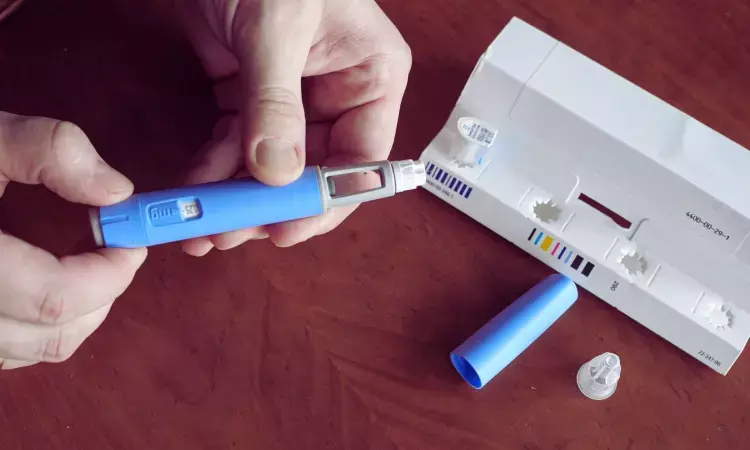- Home
- Medical news & Guidelines
- Anesthesiology
- Cardiology and CTVS
- Critical Care
- Dentistry
- Dermatology
- Diabetes and Endocrinology
- ENT
- Gastroenterology
- Medicine
- Nephrology
- Neurology
- Obstretics-Gynaecology
- Oncology
- Ophthalmology
- Orthopaedics
- Pediatrics-Neonatology
- Psychiatry
- Pulmonology
- Radiology
- Surgery
- Urology
- Laboratory Medicine
- Diet
- Nursing
- Paramedical
- Physiotherapy
- Health news
- Fact Check
- Bone Health Fact Check
- Brain Health Fact Check
- Cancer Related Fact Check
- Child Care Fact Check
- Dental and oral health fact check
- Diabetes and metabolic health fact check
- Diet and Nutrition Fact Check
- Eye and ENT Care Fact Check
- Fitness fact check
- Gut health fact check
- Heart health fact check
- Kidney health fact check
- Medical education fact check
- Men's health fact check
- Respiratory fact check
- Skin and hair care fact check
- Vaccine and Immunization fact check
- Women's health fact check
- AYUSH
- State News
- Andaman and Nicobar Islands
- Andhra Pradesh
- Arunachal Pradesh
- Assam
- Bihar
- Chandigarh
- Chattisgarh
- Dadra and Nagar Haveli
- Daman and Diu
- Delhi
- Goa
- Gujarat
- Haryana
- Himachal Pradesh
- Jammu & Kashmir
- Jharkhand
- Karnataka
- Kerala
- Ladakh
- Lakshadweep
- Madhya Pradesh
- Maharashtra
- Manipur
- Meghalaya
- Mizoram
- Nagaland
- Odisha
- Puducherry
- Punjab
- Rajasthan
- Sikkim
- Tamil Nadu
- Telangana
- Tripura
- Uttar Pradesh
- Uttrakhand
- West Bengal
- Medical Education
- Industry
Weekly Semaglutide Offers Long-Term Relief: Better Glycaemic Control and Less Insulin in Type 2 Diabetes, Study Finds

Italy: A recent multicentre real-world study supports the long-term effectiveness of once-weekly semaglutide as a valuable addition to treatment regimens for type 2 diabetes (T2D), even in patients already receiving insulin.
The study, published in Diabetes/Metabolism Research and Reviews, highlights semaglutide’s ability to significantly improve glycaemic control, promote weight loss, and reduce cardiovascular risk factors. Notably, it also offers the potential for insulin dose reduction or complete discontinuation, underscoring its role in simplifying diabetes management while enhancing overall treatment outcomes.
The advent of glucagon-like peptide 1 receptor agonists (GLP-1RAs) has opened promising new pathways in managing type 2 diabetes (T2D), focusing on achieving optimal glycaemic control while reducing the overall treatment burden. In this context, a multicentre retrospective real-world study was conducted to evaluate the long-term effectiveness of once-weekly semaglutide in patients with T2D who were already receiving insulin therapy.
Benedetta Maria Bonora, Department of Medicine, University of Padova, Padua, Italy, and colleagues aimed to determine whether semaglutide could enhance glycaemic and weight outcomes but also offer the potential for insulin dose reduction or discontinuation, ultimately simplifying diabetes management.
For this purpose, the researchers included individuals with type 2 diabetes who were on basal and/or bolus insulin and had initiated once-weekly semaglutide at 18 specialist care centers. Retrospective data were collected on baseline clinical characteristics, along with follow-up values of HbA1c and body weight.
The primary outcome was the change in HbA1c, assessed using a mixed model for repeated measures, while secondary outcomes focused on changes in body weight, insulin dose adjustments, and rates of insulin discontinuation.
The study revealed the following findings:
- The study included 674 participants with a mean age of 61.7 years and an average diabetes duration of 11.5 years. The baseline HbA1c was 8.2%.
- Over a median follow-up of 18 months, once-weekly semaglutide significantly reduced HbA1c by 0.9% and body weight by 4.3 kg.
- 60% of patients achieved an HbA1c level below 7%.
- 32.8% of patients were able to discontinue insulin therapy, and 72.5% of them maintained an HbA1c under 7%.
- Among those on basal-bolus insulin, 75% discontinued bolus insulin, with 62% achieving HbA1c below 7%.
- Factors predicting insulin discontinuation included shorter diabetes duration, lower initial HbA1c, and lower baseline insulin doses.
- In patients who continued insulin, semaglutide use was linked to a reduced total daily insulin requirement.
“The findings from this long-term real-world study reinforce the role of once-weekly semaglutide as a valuable addition to insulin-based regimens for type 2 diabetes,” the authors stated. They further noted that the therapy supports effective glycaemic and weight control and holds the potential for reducing or even discontinuing insulin doses, along with possible improvements in cardiovascular risk factors.
Reference:
Bonora, B. M., Giaccari, A., Consoli, A., Broglio, F., Avogaro, A., & Fadini, G. P. (2025). Long-Term Effectiveness of Once-Weekly Semaglutide in Patients With Type 2 Diabetes Previously Treated With Insulin. A Multicentre Real-World Study. Diabetes/Metabolism Research and Reviews, 41(4), e70045. https://doi.org/10.1002/dmrr.70045
Dr Kamal Kant Kohli-MBBS, DTCD- a chest specialist with more than 30 years of practice and a flair for writing clinical articles, Dr Kamal Kant Kohli joined Medical Dialogues as a Chief Editor of Medical News. Besides writing articles, as an editor, he proofreads and verifies all the medical content published on Medical Dialogues including those coming from journals, studies,medical conferences,guidelines etc. Email: drkohli@medicaldialogues.in. Contact no. 011-43720751


